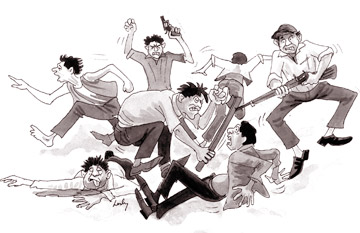Politics, violence and international theories
 This column, being a column devoted to contemporary politics could
ill afford to gloss over the tragic events that rocked the country’s
political firmament during the week that preceded. One popular
politician was killed while another popular politician lay in a hospital
wounded. All that because they wanted to serve the masses! This column, being a column devoted to contemporary politics could
ill afford to gloss over the tragic events that rocked the country’s
political firmament during the week that preceded. One popular
politician was killed while another popular politician lay in a hospital
wounded. All that because they wanted to serve the masses!
Sounds ironic with a tinge of paradox but yet it is the truth about
politics, a field that is known for its strange possibilities. In the
past the trend had been for clashes between rival parties as they held
equal stakes at election time but this time since the rivals posed no
threat the contest was for consolidation within the same party. Thus the
clash is clearly not for ideological reasons but for ‘political say’ and
‘upmanship’. So do we just blame the two politicians and their
supporters for using violence to achieve their political goals?
Bygone era
It is popular story in this country that the politicians of the old
school, those who took to politics soon after independence, were a
decent lot; ‘non violent, incorrupt, gentlemanly and all that’. But the
irony of the political reality today is, despite all that homage paid in
general for those gentlemen of the bygone era no man with gentle
qualities could win an election in present day Sri Lanka. This again is
a social paradox but yet it is the truth about contemporary politics in
the country.

The reason for this is, even though the politicians of the old school
were gentlemanly they were people bent in preserving the status quo,
knowingly or unknowingly, of the old political order that was not
conducive for reformations expected in a nation emerging out of years of
colonialism.
Political careers
There was rampant poverty in this country soon after independence and
people were hungry. In 1953 they brought a government down because it
increased the price of rice by a mere 25 cents.
When people are faced with the difficulty of meeting their day-to-day
needs, it is human for them to compromise their rights for the sake of
their immediate needs. It is then that the polity would look for
representatives who are responsive for their needs however uneducated
like and even violent such representatives could be.
Further in a country where popular reforms are resisted or postponed
through various guises it is natural that the revolutionary type that
rebel against the existing order becomes the guardian angels of common
man and thus violence and those who give leadership to violence hold
sway.
Therefore we have a situation where the politicians cannot extricate
themselves from violence if they are to be successful in their political
careers.
We could always argue against this theory to say that it is 63 years
after independence and hence that is enough time for the leaders in this
country to set things in order. But the fact, however, even though we
are 63 years old as a nation, the basic needs of the majority in this
country still remains unfulfilled. First it was hunger, then dwellings,
then employment, education etc. and the list goes on.
Swabasha Act
Although reforms have been introduced after independence their
implementations have been scuttled, often at their birth pangs by the
powerful elitist lobby in this country that prefer to continue the old
order that have served them well through generations. The opposition to
the Swabasha Act, is a case in point.
Swabasha Act was introduced to correct a historical wrong that
deprived the majority their basic language rights for generations.
If implemented, in its true spirit the Swabasha Act would have
empowered the people in this country as the true masters of their
destiny. But that would have meant marginalizing the powerful elites who
held the power in all social and economic spheres and hence they
sabotaged those reforms raising a ‘minority bogey’. This is not to say
that a country after 440 years of colonialism could revert back to the
pre-colonial order with everything in its pristine best. And also in the
current international order the country has to keep up with the Joneses
of ‘internationalism’. Yet the idea is that if we are to retain the
democratic system of governance, reforms are necessary to empower the
masses to feel that they are in control of affairs.
Political violence
That is the best way that people could be dissuaded from
revolutionary catch phrases and violence. Who is the voter who would
wish to support a rebel like political character, if his basic needs are
met by the prevailing political order?
International rights groups issuing statement from their ivory towers
in New York and London have criticized political violence in Sri Lanka
as ‘customary’.
Such organizations always see the down side of developing countries
and for them even democracies are not democratic unless aligned to their
international power blocks politically.
It is customary for them to lack empathy to appreciate the problems
of new nations embroiled between people’s basic needs and universal
standards propounded by advanced nations.
The key word however in weaning the nation from political violence is
‘empowering the people’ and to achieve that end the people could place
their trust in the present political leadership that has achieved much
in that direction.
[email protected]
|



